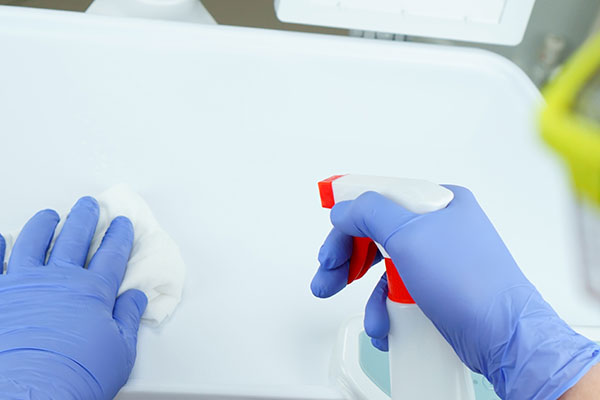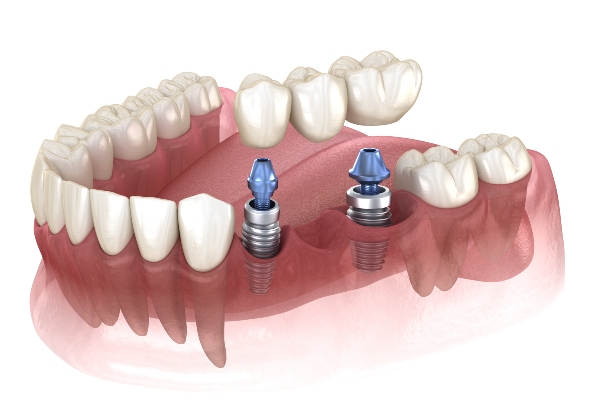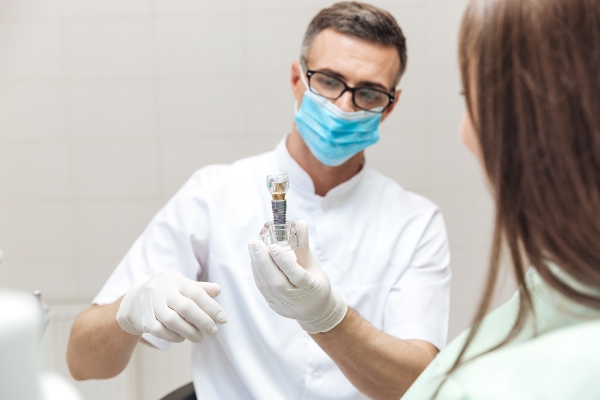Common Dental Infection Control Procedures to Protect You During COVID-19

According to the Centers for Disease Control and Prevention (CDC), COVID-19 is believed to spread mostly between people in close proximity, which means dental offices need to ramp up their infection control procedures to protect their patients. Dental procedures involving dental tools (including hand tools and ultrasonic scalers) and air-water syringes produce a spray that may contain contaminated aerosols and droplets.
Common dental infection control procedures
For those who have emergency dental issues, are not symptomatic for COVID-19 and have no history of potential exposure to COVID-19, the dentist will adhere to proper PPE and infection control protocols to protect the patient from contracting the disease. Common dental infection control procedures include the following.
Patient evaluation
Foremost, dental professionals need to identify suspected cases of coronavirus disease. Normally, a patient with coronavirus in the acute febrile stage should not visit the dental office. In this care, the dentist will identify the patient and not treat the patient in the dental office but instead, promptly quarantine the patient and report to the infection control department as soon as possible.
When patients come into the dental office, their body temperature will be measured. They will also have to answer questions about their medical history, travel history and potential contact with someone who might have had coronavirus. If the patient fits into a high-risk profile after the initial evaluation, they will be advised to self-isolate for 14 days and report any feverish feeling or flu-like symptoms to the local health department.
Hand hygiene
There are reports about fecal-oral transmission for COVID-19, which makes hand hygiene important in a dental office. Dental professionals must reiterate the importance of good hand hygiene. More specifically, dentists will wash their hands before examining the patient, before a dental procedure, after touching the patient, after touching unsterilized surfaces and equipment and after touching damaged skin or wounds, body fluid, blood, oral mucosa, secretion and excreta. Dental professionals will also be cautious and avoid touching their eyes, nose or mouth.
Rubber dam isolation
Using rubber dams can greatly reduce the production of saliva- or blood-contaminated aerosol or spatter, especially in procedures when high-speed hand tools and ultrasonic devices are needed. When using a rubber dam, additional high-volume suction for spattering and aerosol will be used during the treatment, as well as regular suction. In some cases, if rubber dam isolation is not possible, the dentist will use manual devices such as hand scalers for decay removal and periodontal scaling to reduce the production of aerosol as much as possible.
Disinfection and sterilization
Dental offices are taking extra measures to ensure effective disinfection of the office area. Cleaning and sterilization are done in accordance with CDC guidelines. Public areas and devices will be cleaned frequently and disinfected, including door handles, chairs and desks. Every reusable instrument will be pre-treated, cleaned, sterilized and stored properly.
In conclusion
Dental offices will continue to observe best practices regarding infection control to keep patients safe throughout the COVID-19 pandemic. If you have a dental emergency, contact the dentist as soon as possible for more information.
Request an appointment here: https://artisandentalbellevue.com or call Artisan Dental at (425) 454-2005 for an appointment in our Bellevue office.
Check out what others are saying about our services on Google: Read our Google reviews.
Recent Posts
Dental implants are effective, long-lasting artificial teeth. Implants are surgically attached to the jawbone to look and function like natural teeth. As a result, patients can chew, talk, and laugh without worrying about dentures slipping. They also improve oral health. This article explores when and why to get implants and the qualifying factors for treatment.Patients…
Dental implants replace missing teeth and help with chewing, speaking, and smiling. They can consist of titanium or a combination of titanium and ceramic materials. Dental implants serve as anchors for artificial replacements: full dentures, partial dentures, dental crowns, and bridges. If you are considering dental implants, this guide will help you know what to…
Dental implants are artificial roots that a dentist surgically places into the jawbone. The prosthetic tooth is then attached to the implant and acts like a real tooth, replacing missing teeth or repairing broken ones. This guide will review the three different types of dental implants available today.Endosteal implants contain titanium that dentists place into…
How long dental crowns last depends on how well you take care of them. A crown is expected to last about 15 years, but with the proper care, it could last twice as long. If a crown eventually does wear out, you need to have a replacement because the tooth underneath has been permanently altered.…











